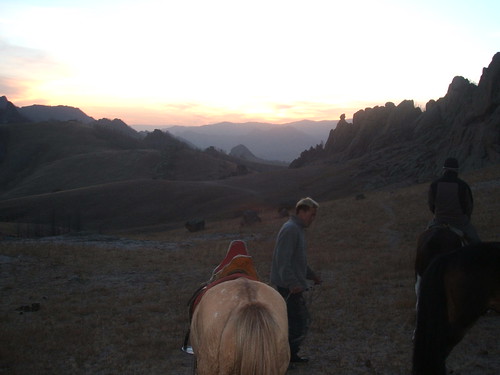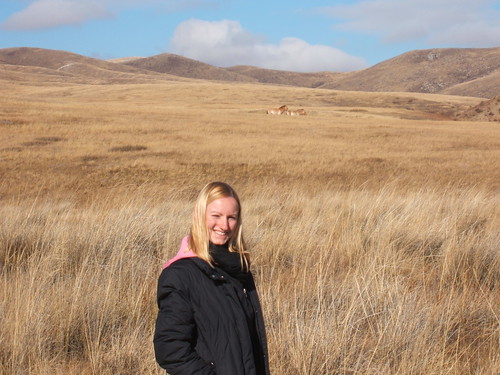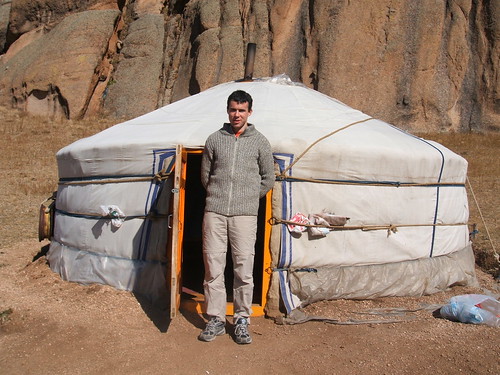Ulan Bator, Mongolia and Trans-Mongolian Railway, Ulan Bator-Beijing Leg
 Monday to Sunday, 9 - 15 October 2006
Monday to Sunday, 9 - 15 October 2006We stay at the "UB Guesthouse". The mattresses are like concrete and every crevice in the place has been converted into some sort of room but the staff, headed by the dynamic Korean owner Mr. Kim, are very helpful, arranging tours and train tickets.
Ulan Bator is a bit of an eyesore. As the Mongolians are a nomadic people, the site of the city moved about alot until it fixed on the current spot in the 1700s. With the way the city is treated, it looks as if it might move again: stray goats graze everywhere and the suburbs look like an ever-expanding landfill. The Tidy Towns Awards Committee hasn't visited any time recently.
The Mongolians are a very friendly people though and there are a couple of places of interest: the Gandan Monastery, with a 26 metre high Buddha as its centrepiece, houses the Buddhist University of Mongolia. Here you can do 4 year bachelor degrees, including one in chanting!
We do a day trip to Hustai National Park to see the "Takhi" horse. This horse disappeared in the wild 30 years ago. It has since been successfully re-introduced from captivity into the park. The park is 100 km from Ulan Bator and the hostel arranged for a guy to drive us there. We set off in high spirits, humming the air of "My Lovely Horse". Little did we realise that we ourselves would be threatened with extinction before the day was out. Our driver's nickname in Mongolian sounded like "whiskey" and he drove like he had drunk a gallon of it. We zig-zagged at breakneck speed through Ulan Bator's morning rush-hour - coming within
 inches of hitting dozens of pedestrians and a few breakfasting goats. On reaching the open road, he kept up a speed at which the engine of his Hyundai sounded like a hairdryer in great pain. He had to slow down a bit when we reached the park - it took us two hours of driving around dirt-tracks and squinting through binoculars before we spotted two of the Takhi (there are over a hundred in the park). For wild horses, these two didn't move much. At least it made it easier to get them on camera.
inches of hitting dozens of pedestrians and a few breakfasting goats. On reaching the open road, he kept up a speed at which the engine of his Hyundai sounded like a hairdryer in great pain. He had to slow down a bit when we reached the park - it took us two hours of driving around dirt-tracks and squinting through binoculars before we spotted two of the Takhi (there are over a hundred in the park). For wild horses, these two didn't move much. At least it made it easier to get them on camera. For the rest of our time in Mongolia, we stay with a family in a "ger" camp in Terelji National Park. The "ger" tents and camp are fairly basic - the toilet is not for the faint hearted: a wooden hut with a few planks over a very dark and very smelly hole in the ground. Civilisation is not too far away though. The "Genghis Khan Golf and Country Club" is a mile from the camp. The green fees are astronomical by Mongolian standards - $50 for 18 holes. This is a bit rich for our blood. As if to prove that members' clubs are the same the world over, when we ask could we walk the course for free, a committee member clad in a salmon-pink polo neck and tartan pants a few sizes too small, snorts and gives us a very stern "No". Revenge is sweet though, as we use the pristine toilets of the country club for the next few days.
For the rest of our time in Mongolia, we stay with a family in a "ger" camp in Terelji National Park. The "ger" tents and camp are fairly basic - the toilet is not for the faint hearted: a wooden hut with a few planks over a very dark and very smelly hole in the ground. Civilisation is not too far away though. The "Genghis Khan Golf and Country Club" is a mile from the camp. The green fees are astronomical by Mongolian standards - $50 for 18 holes. This is a bit rich for our blood. As if to prove that members' clubs are the same the world over, when we ask could we walk the course for free, a committee member clad in a salmon-pink polo neck and tartan pants a few sizes too small, snorts and gives us a very stern "No". Revenge is sweet though, as we use the pristine toilets of the country club for the next few days.The scenery there is spectacular - alot of Eastern European film makers have used it to film cowboy movies - and, much to Leahanne's joy, we do a bit of pony-trekking. The saddles used by Mongolians are different from those used in the western world and don't appear to be designed for sitting on as they immediately cut off the circulation to your arse - the arses of the ponies are alive and well though as they fart machine-gun-like for the whole of the trek. "Columbia", the head of the host family (socalled because of the yellow Columbia T-shirt he wears every day), can't speak much English but is a good communicator. There are a couple of Americans staying in the camp and, on learning this, he describes a recent flying visit by George Bush to Mongolia. GWB's war against terror does not impress Columbia as he concludes, with a sweeping thumbs-down gesture, that "George Bush bad".
We make our last big train journey for a while on Sunday: Ulan Bator to Beijing. At the first station in China, each carriage is lifted so that the bogies of the train can be changed (the Russian railways have a wider guage than the Chinese). The Chinese bogie-men work to the tune of the Vienna Waltz and the Bee Gees' hit "If You Leave Me Now" blaring from loudspeakers. We're not in Kansas now.
If you want to see more photos of Ulan Bator click here and more photos of the ger camp click here.

0 Comments:
Post a Comment
<< Home